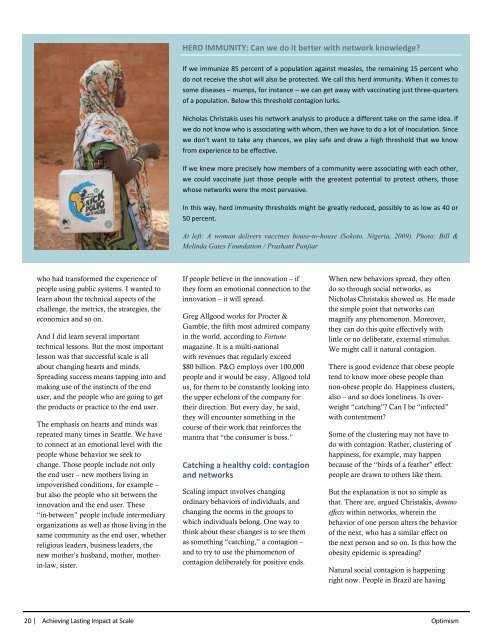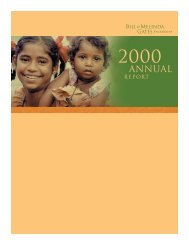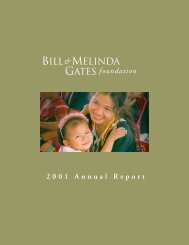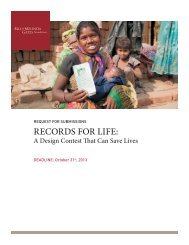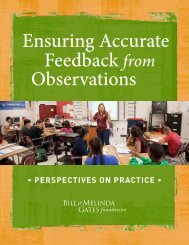Achieving Lasting Impact at Scale - Bill & Melinda Gates Foundation
Achieving Lasting Impact at Scale - Bill & Melinda Gates Foundation
Achieving Lasting Impact at Scale - Bill & Melinda Gates Foundation
Create successful ePaper yourself
Turn your PDF publications into a flip-book with our unique Google optimized e-Paper software.
who had transformed the experience of<br />
people using public systems. I wanted to<br />
learn about the technical aspects of the<br />
challenge, the metrics, the str<strong>at</strong>egies, the<br />
economics and so on.<br />
And I did learn several important<br />
technical lessons. But the most important<br />
lesson was th<strong>at</strong> successful scale is all<br />
about changing hearts and minds.<br />
Spreading success means tapping into and<br />
making use of the instincts of the end<br />
user, and the people who are going to get<br />
the products or practice to the end user.<br />
The emphasis on hearts and minds was<br />
repe<strong>at</strong>ed many times in Se<strong>at</strong>tle. We have<br />
to connect <strong>at</strong> an emotional level with the<br />
people whose behavior we seek to<br />
change. Those people include not only<br />
the end user – new mothers living in<br />
impoverished conditions, for example –<br />
but also the people who sit between the<br />
innov<strong>at</strong>ion and the end user. These<br />
“in-between” people include intermediary<br />
organiz<strong>at</strong>ions as well as those living in the<br />
same community as the end user, whether<br />
religious leaders, business leaders, the<br />
new mother’s husband, mother, motherin-law,<br />
sister.<br />
20 | <strong>Achieving</strong> <strong>Lasting</strong> <strong>Impact</strong> <strong>at</strong> <strong>Scale</strong><br />
HERD IMMUNITY: Can we do it better with network knowledge?<br />
If we immunize 85 percent of a popul<strong>at</strong>ion against measles, the remaining 15 percent who<br />
do not receive the shot will also be protected. We call this herd immunity. When it comes to<br />
some diseases – mumps, for instance – we can get away with vaccin<strong>at</strong>ing just three‐quarters<br />
of a popul<strong>at</strong>ion. Below this threshold contagion lurks.<br />
Nicholas Christakis uses his network analysis to produce a different take on the same idea. If<br />
we do not know who is associ<strong>at</strong>ing with whom, then we have to do a lot of inocul<strong>at</strong>ion. Since<br />
we don’t want to take any chances, we play safe and draw a high threshold th<strong>at</strong> we know<br />
from experience to be effective.<br />
If we knew more precisely how members of a community were associ<strong>at</strong>ing with each other,<br />
we could vaccin<strong>at</strong>e just those people with the gre<strong>at</strong>est potential to protect others, those<br />
whose networks were the most pervasive.<br />
In this way, herd immunity thresholds might be gre<strong>at</strong>ly reduced, possibly to as low as 40 or<br />
50 percent.<br />
At left: A woman delivers vaccines house-to-house (Sokoto, Nigeria, 2009). Photo: <strong>Bill</strong> &<br />
<strong>Melinda</strong> G<strong>at</strong>es Found<strong>at</strong>ion / Prashant Panjiar<br />
If people believe in the innov<strong>at</strong>ion – if<br />
they form an emotional connection to the<br />
innov<strong>at</strong>ion – it will spread.<br />
Greg Allgood works for Procter &<br />
Gamble, the fifth most admired company<br />
in the world, according to Fortune<br />
magazine. It is a multi-n<strong>at</strong>ional<br />
with revenues th<strong>at</strong> regularly exceed<br />
$80 billion. P&G employs over 100,000<br />
people and it would be easy, Allgood told<br />
us, for them to be constantly looking into<br />
the upper echelons of the company for<br />
their direction. But every day, he said,<br />
they will encounter something in the<br />
course of their work th<strong>at</strong> reinforces the<br />
mantra th<strong>at</strong> “the consumer is boss.”<br />
C<strong>at</strong>ching a healthy cold: contagion<br />
and networks<br />
Scaling impact involves changing<br />
ordinary behaviors of individuals, and<br />
changing the norms in the groups to<br />
which individuals belong. One way to<br />
think about these changes is to see them<br />
as something “c<strong>at</strong>ching,” a contagion –<br />
and to try to use the phenomenon of<br />
contagion deliber<strong>at</strong>ely for positive ends.<br />
When new behaviors spread, they often<br />
do so through social networks, as<br />
Nicholas Christakis showed us. He made<br />
the simple point th<strong>at</strong> networks can<br />
magnify any phenomenon. Moreover,<br />
they can do this quite effectively with<br />
little or no deliber<strong>at</strong>e, external stimulus.<br />
We might call it n<strong>at</strong>ural contagion.<br />
There is good evidence th<strong>at</strong> obese people<br />
tend to know more obese people than<br />
non-obese people do. Happiness clusters,<br />
also – and so does loneliness. Is overweight<br />
“c<strong>at</strong>ching”? Can I be “infected”<br />
with contentment?<br />
Some of the clustering may not have to<br />
do with contagion. R<strong>at</strong>her, clustering of<br />
happiness, for example, may happen<br />
because of the “birds of a fe<strong>at</strong>her” effect:<br />
people are drawn to others like them.<br />
But the explan<strong>at</strong>ion is not so simple as<br />
th<strong>at</strong>. There are, argued Christakis, domino<br />
effects within networks, wherein the<br />
behavior of one person alters the behavior<br />
of the next, who has a similar effect on<br />
the next person and so on. Is this how the<br />
obesity epidemic is spreading?<br />
N<strong>at</strong>ural social contagion is happening<br />
right now. People in Brazil are having<br />
Optimism


